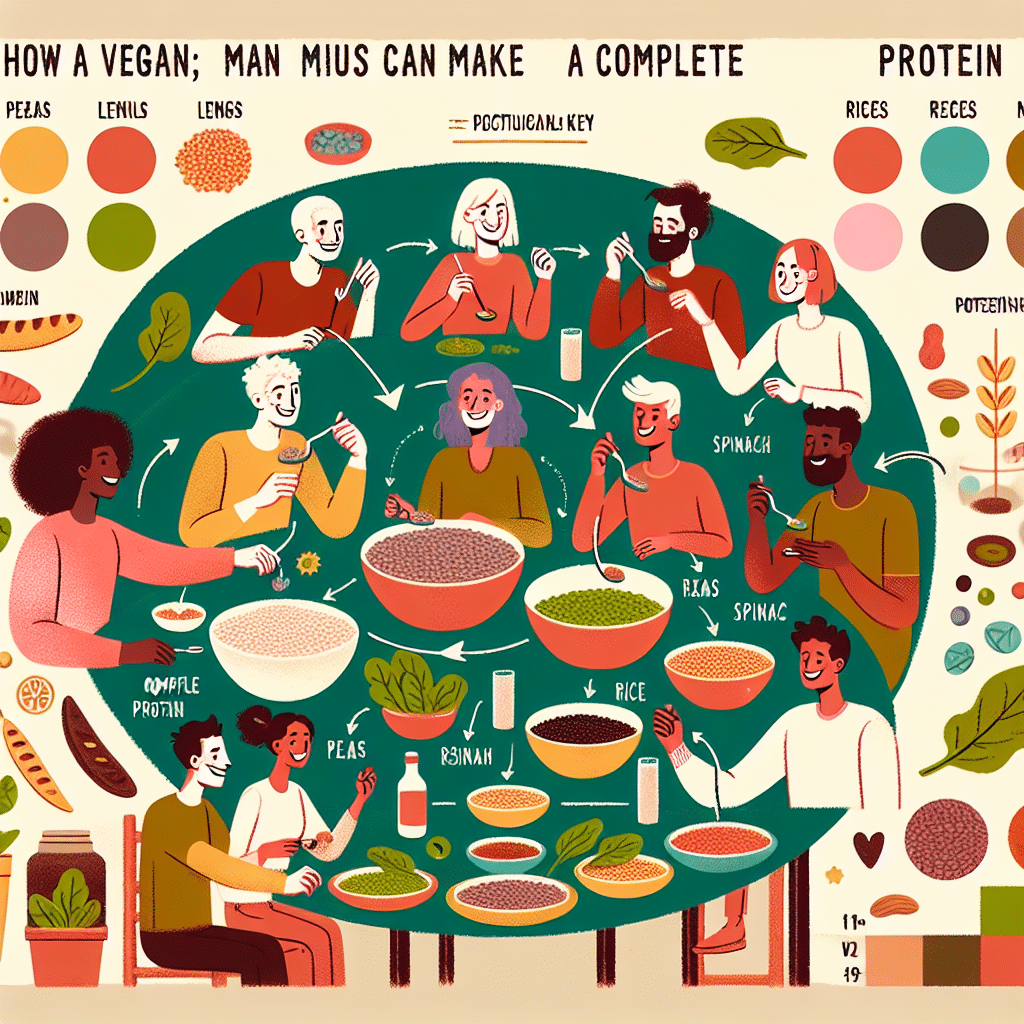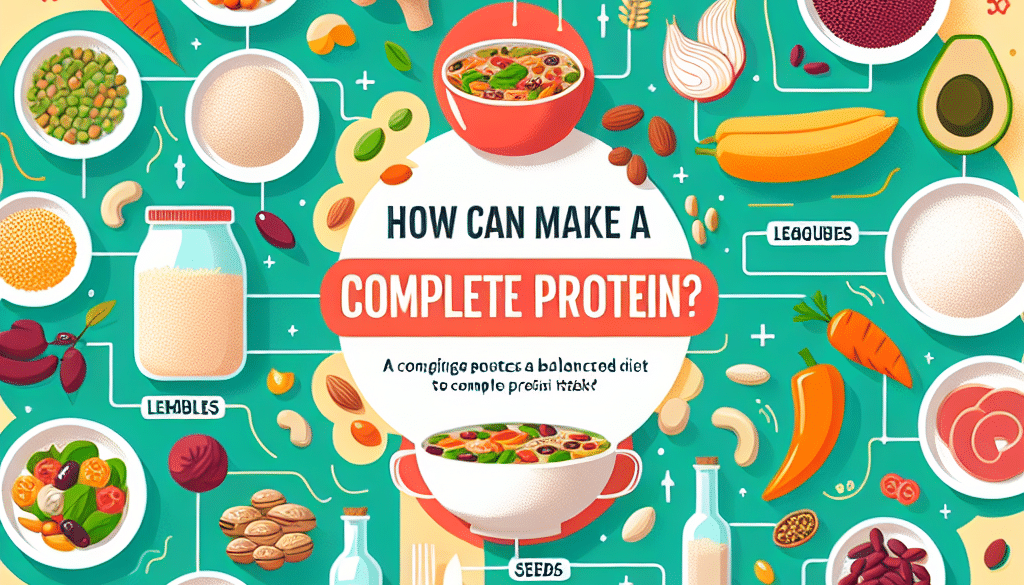How Can Vegans Make A Complete Protein?
-
Table of Contents
- Complete Protein for Vegans: How to Ensure Adequate Intake
- Understanding Complete Proteins
- Combining Plant-Based Proteins
- Plant-Based Complete Protein Sources
- Strategies for Optimizing Protein Intake
- Case Studies and Statistics
- Conclusion: Achieving Complete Protein as a Vegan
- ETprotein: Your Source for High-Quality Vegan Proteins
Complete Protein for Vegans: How to Ensure Adequate Intake

Protein is a crucial macronutrient that plays a vital role in virtually every bodily function. For vegans, who abstain from animal products, getting enough complete protein—protein containing all nine essential amino acids—can be a concern. However, with careful planning and knowledge of plant-based protein sources, vegans can easily meet their protein needs. This article explores how vegans can make a complete protein, ensuring a well-rounded and nutritious diet.
Understanding Complete Proteins
Proteins are made up of amino acids, which are often referred to as the building blocks of life. While the body can produce some amino acids, there are nine essential amino acids that must be obtained through diet. A complete protein contains an adequate proportion of these nine essential amino acids. Animal products, such as meat, dairy, and eggs, naturally contain complete proteins. The challenge for vegans is to combine plant-based foods that together provide all the essential amino acids.
Combining Plant-Based Proteins
Historically, it was believed that vegans needed to consume complementary proteins at the same meal to make a complete protein. However, current research suggests that the body can combine amino acids from different meals throughout the day. This means that vegans can eat a variety of protein sources without worrying about pairing them at every meal.
- Legumes (beans, lentils, chickpeas)
- Grains (quinoa, rice, barley)
- Nuts and seeds (almonds, chia seeds, hemp seeds)
- Soy products (tofu, tempeh, edamame)
By including a diverse array of these foods in their daily diet, vegans can ensure they are getting all the essential amino acids they need.
Plant-Based Complete Protein Sources
Some plant-based foods are complete proteins on their own. These can be excellent staples in a vegan diet.
- Quinoa: A grain that is also a complete protein, quinoa is versatile and can be used in salads, soups, or as a side dish.
- Soy: Soybeans and soy products like tofu and tempeh are among the richest plant-based protein sources and contain all essential amino acids.
- Buckwheat: Despite its name, buckwheat is not related to wheat and is gluten-free. It’s a complete protein that can be used in porridges, pancakes, and noodles.
- Hemp seeds: These seeds are not only a complete protein but also a great source of omega-3 fatty acids.
- Chia seeds: Chia seeds are complete proteins and can be added to smoothies, oatmeal, or used to make chia pudding.
- Spirulina: This blue-green algae is a complete protein and can be added to smoothies or taken as a supplement.
Strategies for Optimizing Protein Intake
Vegans can optimize their protein intake by incorporating a variety of plant-based proteins into their meals. Here are some strategies:
- Include a protein source in every meal and snack.
- Use plant-based protein powders to supplement when necessary.
- Plan meals to ensure a variety of protein sources throughout the day.
- Snack on nuts, seeds, or roasted chickpeas for a protein boost.
Case Studies and Statistics
Research has shown that a well-planned vegan diet can provide all the necessary nutrients, including complete proteins. For example, a study published in the American Journal of Clinical Nutrition found that vegan diets can meet the recommended daily intake for protein, as long as a variety of plant foods are consumed and caloric intake is adequate.
Statistics from the Academy of Nutrition and Dietetics indicate that vegetarians and vegans typically meet or exceed their protein requirements. However, it’s important for individuals to monitor their own diets, as protein needs can vary based on factors like age, sex, weight, and activity level.
Conclusion: Achieving Complete Protein as a Vegan
Vegans can easily achieve a complete protein intake by eating a variety of plant-based foods. By understanding which foods contain all nine essential amino acids and incorporating a mix of other protein-rich plants, vegans can ensure they are meeting their nutritional needs. With the increasing availability of vegan protein sources and supplements, it’s more convenient than ever to maintain a balanced and complete vegan diet.
ETprotein: Your Source for High-Quality Vegan Proteins
If you’re looking for high-quality vegan protein sources, ETprotein offers a range of organic bulk vegan proteins that can help you meet your dietary needs. Their products include organic rice protein, pea protein, and various seed proteins, all characterized by a neutral taste and non-GMO, allergen-free attributes. With L-(+)-Ergothioneine purity over 98%, ETprotein caters to industries such as nutraceuticals, pharmaceuticals, and food and beverage. Whether you’re a distributor, trader, or manufacturer, ETprotein can provide the protein solutions you need.
About ETprotein:
ETprotein, a reputable protein and L-(+)-Ergothioneine (EGT) Chinese factory manufacturer and supplier, is renowned for producing, stocking, exporting, and delivering the highest quality organic bulk vegan proteins and L-(+)-Ergothioneine. They include Organic rice protein, clear rice protein, pea protein, clear pea protein, watermelon seed protein, pumpkin seed protein, sunflower seed protein, mung bean protein, peanut protein, and L-(+)-Ergothioneine EGT Pharmaceutical grade, L-(+)-Ergothioneine EGT food grade, L-(+)-Ergothioneine EGT cosmetic grade, L-(+)-Ergothioneine EGT reference grade and L-(+)-Ergothioneine EGT standard. Their offerings, characterized by a neutral taste, non-GMO, allergen-free attributes, with L-(+)-Ergothioneine purity over 98%, 99%, cater to a diverse range of industries. They serve nutraceutical, pharmaceutical, cosmeceutical, veterinary, as well as food and beverage finished product distributors, traders, and manufacturers across Europe, USA, Canada, Australia, Thailand, Japan, Korea, Brazil, and Chile, among others.
ETprotein specialization includes exporting and delivering tailor-made protein powder and finished nutritional supplements. Their extensive product range covers sectors like Food and Beverage, Sports Nutrition, Weight Management, Dietary Supplements, Health and Wellness Products, and Infant Formula, ensuring comprehensive solutions to meet all your protein needs.
As a trusted company by leading global food and beverage brands and Fortune 500 companies, ETprotein reinforces China’s reputation in the global arena. For more information or to sample their products, please contact them and email sales(at)ETprotein.com today.














